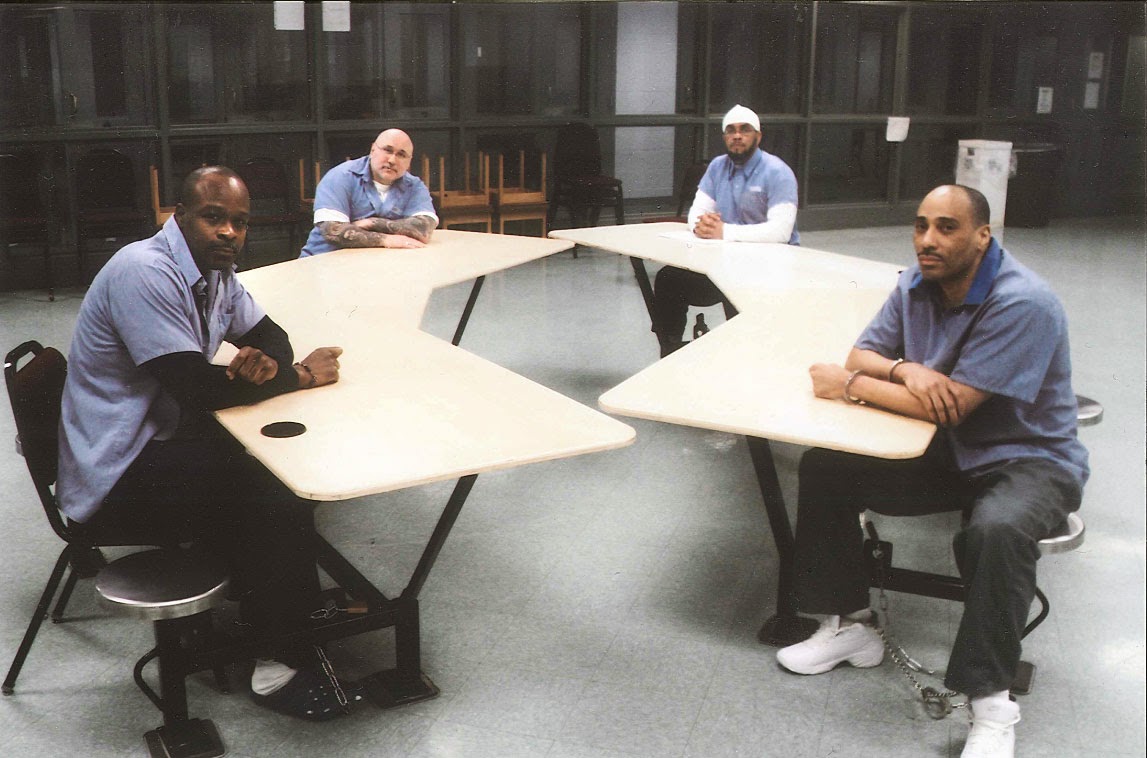This is about the ACLU Media-access case, in which Greg Curry also is a plaintiff, from the ACLU Ohio website:
21 years after the Lucasville prison uprising, the media is still waiting for face-to-face interviews with the condemned prisoners.
For more than two decades, Siddique Hasan, Jason Robb, George Skatzes, Keith LaMar and Greg Curry have claimed they are innocent of the crimes attributed to them during the 1993 prison uprising at Southern Ohio Correctional Facility (SOCF).
Among other things, these five men accuse the state of coercing false testimony from other SOCF prisoners in order to convict them. They have spent years in solitary confinement, soliciting media attention in an attempt to convince the public—and ultimately the court system—that they do not belong where they are.
In response, the Ohio Department of Rehabilitation and Correction (ODRC) has completely banned face-to-face media contact with these men, arguing that they are too much of a security risk to be allowed to tell their stories in person.
In late 2013, the ACLU of Ohio filed a lawsuit challenging this ban. The suit was filed on behalf of Hasan, Robb, Skatzes, LaMar and Curry, as well as one teacher and four reporters, including Pulitzer Prize winner Chris Hedges.
We filed this suit because the ODRC is violating the First Amendment rights of the prisoners and of the press. It’s not hard to see that their actions have very little to do with security and everything to do with silencing an uncomfortable conversation about the Lucasville uprising.
For proof, consider that many other death row inmates in Ohio have been granted face-to-face access to the media. They include spree killer John Fautenberry, neo-Nazi murderer Frank Spisak, and convicted arsonist Kenneth Richey, who has since been released from death row.
In all, Ohio prison officials have approved nearly two dozen media interviews with other death row inmates while denying each and every request for face-to-face interviews with the five Lucasville prisoners. This ban is a special form of extended vengeance, reserved only for them.
These prisoners are complicated characters, and the Lucasville uprising is a complex story.
Hiding these complexities behind a wall of censorship will not make them go away.
The Basics
21 years ago, on Easter Sunday 1993, more than 400 inmates at an overcrowded prison in Lucasville, Ohio staged an 11-day prison uprising. In the ensuing violence, nine inmates and one corrections officer lost their lives.
The Basics – read more here.
Greg Curry,
a prisoner at Ohio State Penitentiary, doing a life sentence on false
and wrongful grounds following the Lucasville prison uprising in 1993,
told Ohio Prison Watch in a letter received today that he would be part of this hunger strike too:
This comes from ABC / AP:
By Julie Carr Smyth, Associated Press, COLUMBUS, Ohio April 10, 2013
Three of five Ohio inmates sentenced to death for a historic prison riot plan a hunger strike starting on the uprising's 20th anniversary Thursday to protest the state's refusal to allow them sit-down media interviews on their cases.
The state has had two decades to tell its side of the story and the inmates known as the Lucasville Five should have their chance, Siddique Abdullah Hasan said in an exclusive telephone interview with The Associated Press on Wednesday.
"We have been suffering very torturous conditions for two decades," said Hasan, formerly Carlos Sanders. "We have never been given the opportunity completely to speak about our cases, to speak to the media — because the media has an enormous amount of power. They can get our message out to the court of public opinion."
This comes from ABC / AP:
By Julie Carr Smyth, Associated Press, COLUMBUS, Ohio April 10, 2013
Three of five Ohio inmates sentenced to death for a historic prison riot plan a hunger strike starting on the uprising's 20th anniversary Thursday to protest the state's refusal to allow them sit-down media interviews on their cases.
The state has had two decades to tell its side of the story and the inmates known as the Lucasville Five should have their chance, Siddique Abdullah Hasan said in an exclusive telephone interview with The Associated Press on Wednesday.
"We have been suffering very torturous conditions for two decades," said Hasan, formerly Carlos Sanders. "We have never been given the opportunity completely to speak about our cases, to speak to the media — because the media has an enormous amount of power. They can get our message out to the court of public opinion."
Twelve staff members were taken hostage on April 11, 1993, Easter Sunday, when inmates overtook the Southern Ohio Correctional Facility in Lucasville. Hasan was convicted for helping plan the murder of Corrections Officer Robert Vallandingham, among 10 who died during the 11-day uprising, the longest deadly prison riot in U.S. history. Hasan denies he was involved in planning or carrying out the killing.
Hasan, Keith LaMar and Jason Robb, all sentenced to death after the uprising, will take their last meals Wednesday evening ahead of their protest at the Ohio State Penitentiary in Youngstown, Hasan said. Also participating will be Gregory Curry, a participant in the rebellion sentenced to life in prison.
James Were, another of the Lucasville Five, is diabetic and will not take part. The fifth man sentenced to death after the riot, George Skatzes, is at a different prison in Chillicothe.
Read the rest here: http://abcnews.go.com/US/wireStory/ap-ohio-prison-riot-convicts-plan-hunger-strike-18924356#.UWW18JOporU

